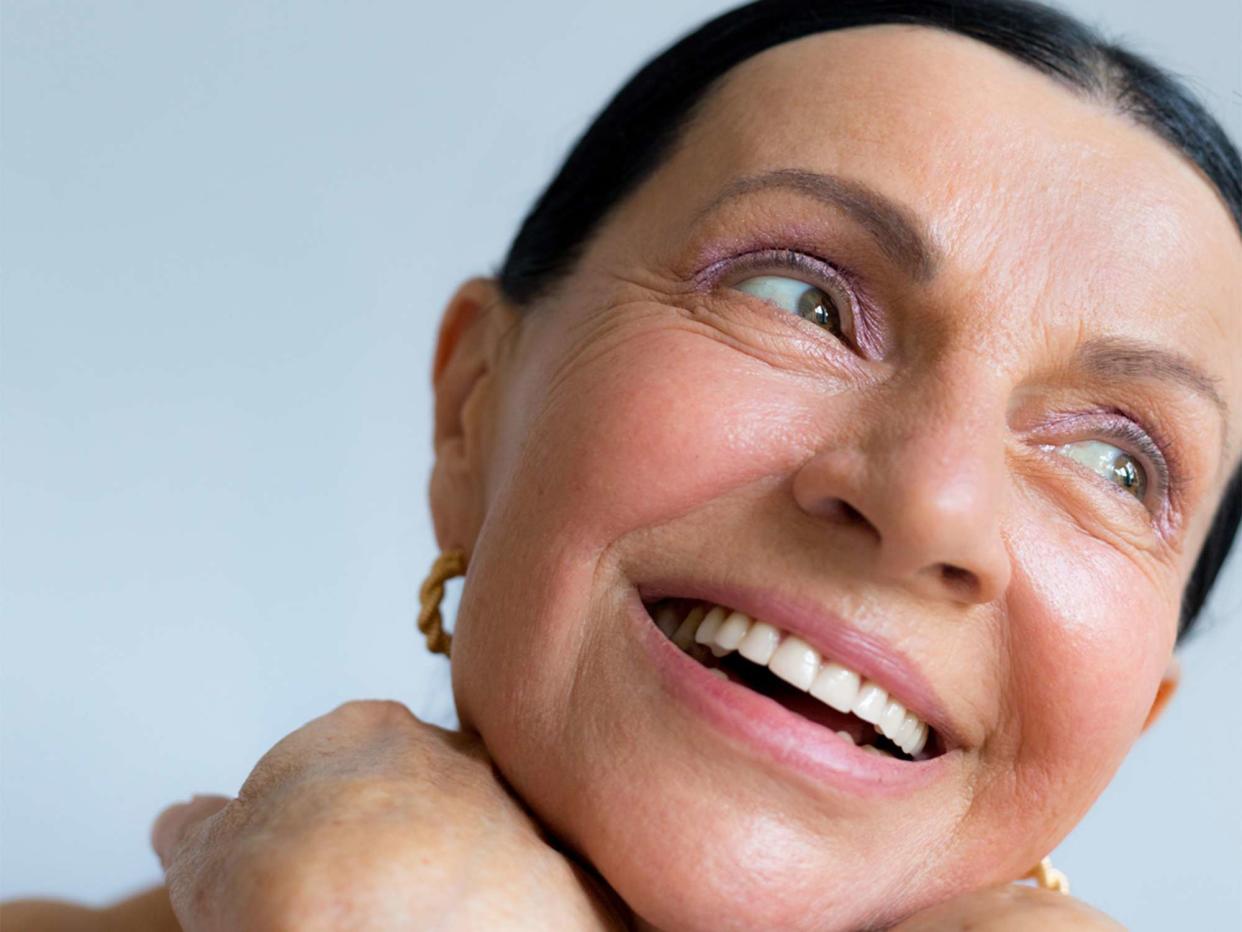Does Oily Skin Actually Age Better? We Investigate

Stocksy
When it comes to aging, everyone wants to know the secrets to keep their skin looking great for as long as possible. Certain nonnegotiables, like wearing SPF daily, are encouraged to achieve optimal skin health and protection. Still, one question has come up over the years: Does oily skin age better than other skin types?
To find out, we tapped into the expertise of three board-certified dermatologists. Keep reading to find out if there's any truth behind the claims that oily skin is the golden ticket to avoiding wrinkles and other inevitable aspects of aging skin.
Kristina Collins, MD, board-certified dermatologist at Austin Skin Physicians
David Kim, MD, board-certified dermatologist at Idriss Dermatology
Kseniya Kobets, MD, director of cosmetic dermatology at Montefiore Einstein Advanced Care
Does Oily Skin Really Age Better?
In short: having oily skin doesn't necessarily mean your skin will age better than other skin types. But the answer to this question is more complex than one may think.
The first thing to understand is that oily skin contains higher-concentration glands that produce sebum (aka oil). Kristina Collins, MD, a board-certified dermatologist at Austin Skin Physicians, explains that the density of these glands leads to a thicker dermis, which is the body's middle layer of skin that supports and gives structure to the outer layer of skin.
"You can imagine that a thicker, sturdier dermis would lead to less folding and wrinkling of the skin," Collins explains. But that's not all—the additional hydration provided by the sebum can act a bit like a moisturizer in minimizing the appearance of fine lines.
"Oily skin may help with aging because sebum is a natural moisturizer and can keep the skin protected and help scars heal better and faster," explains David Kim, MD, board-certified dermatologist at Idriss Dermatology. "This becomes increasingly helpful as we age as our skin loses the ability to hold on to moisture."
Another benefit of having oily skin is that sebum has a high concentration of fatty acids, which could offer protective effects against UV damage. "Not enough to forego SPF," Collins says, "but enough to impart some long-term benefits."
This sounds like a significant win for oily skin in the aging category. But as Collins points out, aging involves much more than fine lines and wrinkles. "People with oily skin tend to have larger pores and are more likely to struggle with acne, which can lead to scarring and texture that give the appearance of premature aging," she says. "Also, the anti-wrinkle benefits of oily skin may be overestimated."
Additionally, although people with oily skin types may experience less fine wrinkles, they may still have deeper wrinkles in some areas, like between the brows, says Kseniya Kobets, MD, director of cosmetic dermatology at Montefiore Einstein Advanced Care.
What Else Impacts Skin Aging?
Many factors, including metabolism, genetics, stress, diet, exercise, and pollution, impact skin aging. "Having oily skin at baseline doesn't mean you are protected from aging," Kobets says. "It's how you treat your body and your skin that shapes the future of your skin."
While genetics play a huge role in how skin changes during aging, it's important to remember that behavior is influential, too. "Behaviors—such as always remembering SPF, maintaining a healthy weight, staying hydrated, avoiding smoking, and taking care of the skin—have a huge impact on our skin and aging, no matter what was coded in our genes," Collins says.
Regardless of whether you have dry, oily, or combination skin, aging can contribute to wrinkles and other changes in the laxity and texture of your skin. You could also experience larger pores, dilated blood vessels, and hyperpigmentation. Here's a bit more information on how different types of skin age:
Oily skin
People with oily skin may experience fewer fine lines and wrinkles but may also be more likely to experience acne, acne scarring, and skin texture abnormalities.
Dry skin
Fine lines and wrinkles may be more pronounced in people with dry skin. "For dry skin, thick creamy moisturizers with lipids and ceramides become increasingly important as we age to keep the skin moisturized and nourished," Kim says.
Combination skin
Combination skin can age both oily skin and dry skin. "I think having combination skin is the best of both worlds," Kobets says. "Once you figure out what works for it, you benefit from the oil glands and not being too dry."
The Final Takeaway
People with oily skin have a few things going in their favor regarding skin aging like they're likely to experience fine lines. Oily skin may also offer protection against UV damage and act as a natural moisturizer. But dermatologists say oily skin doesn't necessarily age better than other skin types.
"Even though we all continue to age over time, when we take care of our body and skin internally and externally, we can still come out on top no matter whether we were endowed with oily or dry skin at birth," Kobets says.
Here are some recommendations for caring for your skin as it ages, no matter what type of skin you have:
Maintaining a healthy lifestyle
Eating balanced, nutritious meals
Exercising regularly
Regularly apply sunscreen to your face, neck, chest, ears, hands, and other areas that will be exposed to the sun.
Perhaps most importantly, remember that everyone is going to age. "It's something we should be proud of," Kim says.

